Pest Control for Marijuana Plants: Expert Tips & Solutions
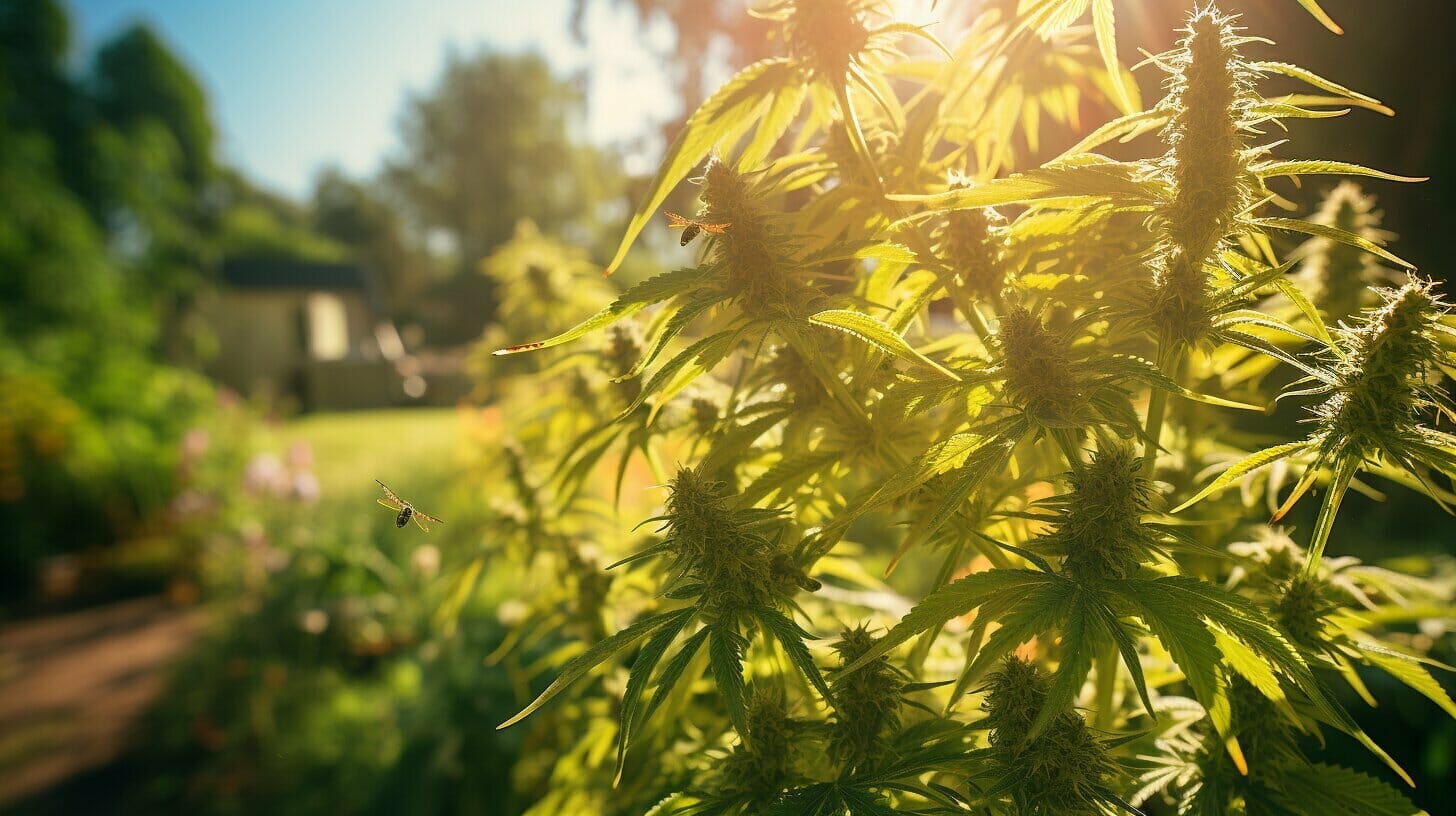
Marijuana cultivation has grown in popularity in recent years due to changing attitudes toward the plant. However, with an increase in cultivation comes an increase in pest activity. Pest control for marijuana plants is essential to ensure a successful and sustainable crop. Implementing effective pest management techniques from reputable sources such as SeedsHereNow.com is crucial for the health and productivity of marijuana plants.
Key Takeaways
- Proper pest control measures are vital for successful marijuana cultivation.
- SeedsHereNow.com is a reputable source of quality cannabis seeds.
- Effective pest management involves identifying and preventing infestations.
Start With High-Quality Cannabis Seeds
One of the best ways to prevent infestations in the garden is to grow a hardy and vigorous strain that is resistant to pests and diseases. By shopping at a reputable seed bank such as Seeds Here Now, you can be sure that you’re getting top-quality seeds that have been bred to withstand pests, diseases, and environmental stressors.
At SHN, customers can choose from a vast selection of regular, feminized, and autoflowering seeds. Whether you are a beginner or an experienced cultivator, you are sure to find the perfect strain for your needs. SHN also offers discreet and secure shipping, ensuring your seeds arrive safely and on time.
One of the reasons SHN is the top choice for cannabis seeds is its commitment to customer satisfaction. The team at SHN is dedicated to providing expert advice and guidance to ensure your growing experience is a success. Their website also offers a wealth of resources and information on cannabis cultivation.
Don’t settle for low-quality seeds that may result in poor yields and disappointing results. Choose SeedsHereNow.com, the best USA seed bank for your marijuana cultivation needs.
Organic Pest Control for Cannabis: A Sustainable Approach
When it comes to cultivating cannabis, pest control is a crucial factor that can make the difference between a successful harvest and a complete failure. While pesticides may seem like an easy solution, they can pose significant risks to the environment and human health. Organic pest control methods offer a safer and more sustainable approach to managing pest infestations, which can help growers avoid harsh chemicals.
One of the most effective ways to control pests organically is through the use of natural remedies and eco-friendly solutions. For example, neem oil is a popular natural remedy that is effective against a wide range of cannabis pests, including spider mites and aphids. Another option is to use beneficial insects, such as ladybugs and predatory mites, to control pest populations. Eco-friendly solutions, such as diatomaceous earth, can also be applied as a natural insecticide, without harming the surrounding environment.
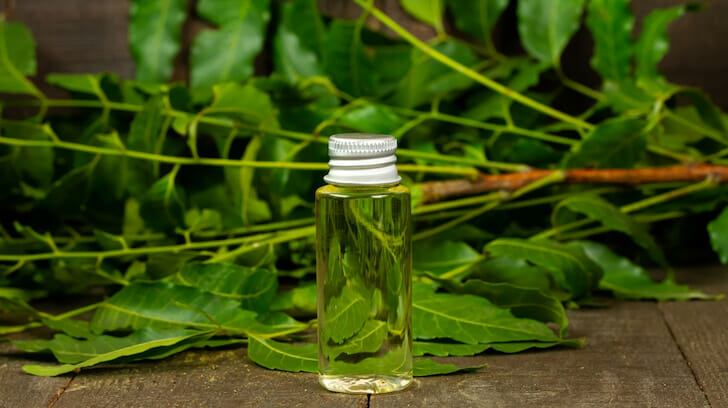
Safe Pest Control for Cannabis Plants
When it comes to eco-friendly pest control for marijuana, it’s important to identify safe solutions that do not harm the plants or the environment. Cultural practices, such as crop rotation and sanitation, can be effective in reducing pest populations. Companion planting is another effective method, where certain plants are grown alongside cannabis to repel pests. For example, planting marigolds around the edge of the garden has been shown to repel harmful insects.
Biological controls, such as nematodes, can also be used to control pests without the use of pesticides. Organic pesticides, made from plant-based ingredients, are also available on the market and can be used as a safer alternative to conventional pesticides. These options offer the benefit of being safe for use on cannabis plants, while also promoting a healthier environment for people, animals, and beneficial insects.
Identifying and Preventing Pests on Marijuana Crops
When it comes to pest management for marijuana crops, early detection is key. The sooner you can identify a pest infestation, the easier it is to prevent it from spreading and causing damage to your plants. Some of the most common pests that can affect marijuana crops include spider mites, aphids, thrips, whiteflies, and caterpillars.
To identify pests on your marijuana plants, it’s important to regularly inspect them for signs of damage or discoloration. Look for chewed leaves, holes, or webbing on the plant’s surface. You may also notice the presence of small insects or their eggs.
Preventing pest infestations on your marijuana crops involves a combination of cultural practices and proactive pest management. One effective strategy is to incorporate companion planting, which involves growing other plants next to your marijuana plants that naturally repel pests. Some examples include lavender, mint, and marigold. Additionally, physical barriers like row covers or netting can prevent pests from accessing your plants.
| Pest | Identification | Prevention |
|---|---|---|
| Spider Mites | Webbing, yellowing leaves | Regular cleaning, neem oil |
| Aphids | Sticky residue, curled leaves | Companion plants, insecticidal soap |
| Thrips | Black feces, scarring on leaves | Yellow sticky traps, beneficial insects |
By being vigilant and implementing preventative measures, you can help protect your marijuana crops from harmful pests and ensure a successful harvest.
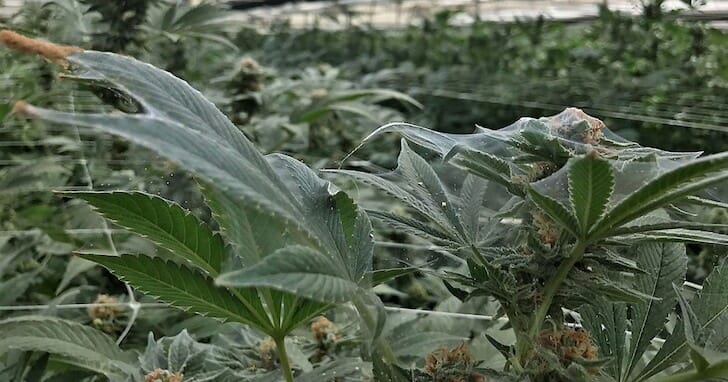
Effective Pest Management for Cannabis Cultivation
As a cannabis grower, it is essential to have a robust pest management program in place. With the proper techniques and strategies, you can protect your plants from a range of pests and ensure a successful crop. Below are some proven methods for controlling pests in your cannabis garden:
Integrated Pest Management
Integrated Pest Management (IPM) is a comprehensive approach to pest control that involves a combination of techniques. Rather than focusing on a single method, IPM incorporates cultural, biological, and physical controls to prevent and manage pests. This sustainable approach aims to minimize the use of pesticides and reduce the environmental impact of pest management.
Implementing an effective IPM program involves several key steps, including:
| Step | Description |
|---|---|
| Monitoring | Regularly inspecting plants for signs of pest activity. |
| Identification | Accurately identifying the type of pest and the level of infestation. |
| Action Threshold | Determining the level of pest activity that requires action. |
| Prevention | Implementing cultural controls, such as proper sanitation practices and plant selection. |
| Control | Applying biological and physical controls, such as natural predators and traps. |
| Monitoring | Evaluating the effectiveness of control measures and adjusting the program as necessary. |
Companion Planting
Companion planting involves growing plants together that have a beneficial relationship. For example, planting marigolds alongside cannabis can help repel pests like aphids and spider mites. Similarly, planting herbs such as basil and mint around cannabis can attract beneficial insects including ladybugs and lacewings that prey on harmful pests.
Physical Barriers
Physical barriers, such as netting and row covers, can be effective at keeping pests out of your garden. They can also help protect plants from extreme weather conditions and other environmental stressors. Make sure to choose a barrier material that is durable and appropriately sized for your garden.
By implementing these pest management techniques, you can protect your cannabis plants from a range of common pests and ensure a successful crop.
Pesticide-Free Solutions for Marijuana Gardens
As the demand for safe and natural cannabis products continues to rise, more cultivators are turning to pesticide-free pest control methods. Traditional pesticides can be harmful to human health and the environment, and residues can be left on marijuana plants, presenting a potential hazard to consumers.
Fortunately, there are several safe and effective alternatives to chemical pesticides. Proper irrigation and sanitation, as well as biological controls such as predatory insects, can help control pests without the need for harmful chemicals.
Companion planting is another effective approach to pesticide-free pest control. Certain plants, like marigolds and basil, are known to repel pests, while others, like clover, can attract beneficial insects that prey on pests. By strategically planting these companion species in and around cannabis gardens, cultivators can create a natural barrier against pests without the use of harmful pesticides.
Natural repellents, such as garlic and neem oil, can also be used to control pests. These substances contain natural compounds that repel pests, making them a safe and effective alternative to chemical pesticides. Other eco-friendly pest control methods include the use of physical barriers, such as row covers and sticky traps.
Sustainable Pest Control Methods for Marijuana Cultivation
When it comes to pest control for marijuana plants, using sustainable methods can ensure long-term health and success for your crops. Here are some strategies to consider:
Crop Rotation
Rotating crops can help reduce pest populations, as some pests are specific to certain plants. By regularly rotating your crops, you can disrupt the pest’s life cycle and prevent them from becoming established in your garden.
Beneficial Insects
Introducing beneficial insects, such as ladybugs and praying mantises, can help control pest populations naturally. These insects prey on common garden pests and can help keep your marijuana plants healthy without the use of harmful chemicals.
Soil Health Optimization
Maintaining healthy soil can help support the natural defenses of your marijuana plants, making them more resistant to pests. Consider using organic fertilizer and compost, practicing no-till gardening, and regularly testing your soil to ensure it has the proper nutrients.
By utilizing these sustainable pest control methods for marijuana cultivation, you can protect your crops without harming the environment or compromising the quality of your product.
Integrated Pest Management: A Comprehensive Approach
Integrated pest management (IPM) is a comprehensive approach to pest control that emphasizes prevention, monitoring, and control methods that are environmentally friendly and economically sustainable. The goal of IPM is to minimize the impact of pests on crops while reducing the use of pesticides and other harmful chemicals.
The first step in implementing an effective IPM program for pest control in marijuana cultivation is to identify the pests that are commonly found in your area. This can be done through regular monitoring and scouting of your plants, as well as by consulting with local agricultural extension services or other experts in the field.
Once you have identified the pests that are most likely to cause problems in your marijuana garden, the next step is to implement a variety of control methods that are tailored to the specific needs of your crop. This may include cultural practices such as crop rotation, pruning, and mulching, as well as the use of natural predators and other biological controls.
| IPM Control Method | Description |
|---|---|
| Cultural Practices | Includes techniques such as crop rotation, pruning, and mulching to reduce pest populations and promote plant health. |
| Biological Controls | Involves the use of natural predators and parasites to control pest populations. |
| Chemical Controls | Involves the use of pesticides or other chemicals to manage pest populations, but is used only as a last resort and should be carefully monitored and applied. |
| Mechanical Controls | Involves physically removing pests or creating barriers to prevent their entry into the growing area. |
It is important to remember that the success of an IPM program depends on careful monitoring and regular maintenance of your growing area. This may include regular inspections of your plants for signs of pest activity, as well as the use of traps and other monitoring tools to detect early signs of infestation. By combining these methods with regular soil testing and nutrient management, you can create a sustainable and effective approach to pest control in your marijuana garden.
The Importance of Regular Monitoring and Maintenance
Regular monitoring and maintenance are crucial aspects of effective pest management in cannabis cultivation. By monitoring your plants regularly, you can detect pests early and take appropriate action before the infestation becomes severe or spreads to other plants. This can save you time, money, and effort in the long run.
Here are some tips on how to establish a monitoring routine:
- Inspect your plants at least once a week for signs of pest activity, including leaves with holes, discoloration, or webbing.
- Check underneath the leaves and at the base of the plant for pests such as aphids, spider mites, and thrips.
- Use a magnifying glass to get a closer look at any suspicious activity.
- Keep a record of your observations, including the date, location, and type of pest activity.
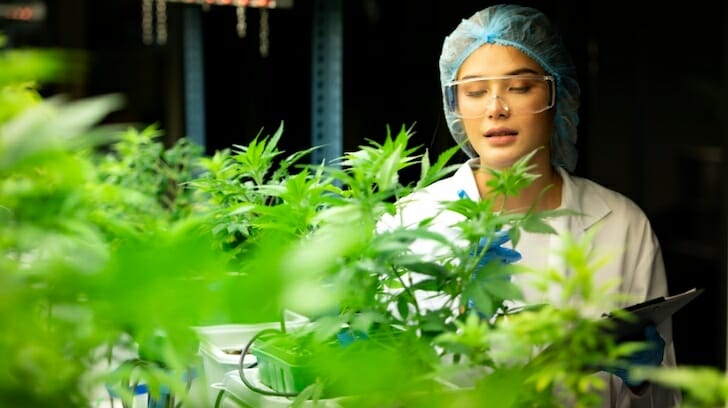
In addition to regular monitoring, maintenance can help prevent pest infestations. Here are some maintenance tips:
- Remove any dead or decaying plant material, as this can attract pests such as fungus gnats and thrips.
- Sanitize your growing area regularly to reduce the spread of disease and pests.
- Ensure proper ventilation and airflow to prevent moisture buildup, which can lead to fungal growth and attract pests.
- Rotate your crops to prevent the buildup of soil-borne pests and diseases.
By following these tips for regular monitoring and maintenance, you can help ensure the health and vitality of your cannabis plants while minimizing pest infestations. Remember, prevention is key in pest management!
The Importance of Proper Pest Control for Marijuana Plants
Proper pest control is crucial for successful cannabis cultivation. In order to produce healthy, high-quality plants, it is important to implement effective pest management techniques. As an expert source for cannabis seeds, SeedsHereNow.com understands the importance of pest control and offers a variety of quality seed varieties to support healthy plant growth.
Implementing Effective Pest Management Techniques
Implementing effective pest management techniques is essential to prevent pests from damaging and potentially destroying your marijuana crops. By choosing the best US seed bank, SeedsHereNow.com, you can ensure that you are starting with quality seeds that are less susceptible to pest damage. Additionally, organic pest control methods can provide sustainable and long-term solutions to preventing pest infestations.
Identifying and Preventing Pests on Marijuana Crops
Common pests that can affect marijuana crops include spider mites, aphids, and thrips. Early detection and prevention are key to avoiding infestations. By regularly monitoring your plants and implementing cultural practices, biological controls, and natural repellents, you can prevent pests from damaging your crops.
Effective Pest Management for Cannabis Cultivation
Effective pest management for cannabis cultivation involves a comprehensive approach that includes integrated pest management (IPM), companion planting, and physical barriers. By utilizing these strategies, you can control pests in your cannabis gardens without relying on harmful pesticides.
Pesticide-Free Solutions for Marijuana Gardens
Using pesticides on marijuana plants can be dangerous and harmful to both the plants and the environment. Instead, opt for safe and pesticide-free pest control methods such as cultural practices, biological controls, and natural repellents. These solutions can be just as effective without posing a risk to your crops or the environment.
Sustainable Pest Control Methods for Marijuana Cultivation
Sustainable pest control methods promote long-term health for marijuana crops and the environment. By optimizing soil health, implementing crop rotation, and introducing beneficial insects, you can create a healthy and resilient growing environment that is less susceptible to pest infestations.
The Importance of Regular Monitoring and Maintenance
Regular monitoring and maintenance is essential in preventing pest infestations from taking hold. By establishing a monitoring routine and identifying early signs of pest activity, you can take proactive measures to control pests before they cause significant damage.
Pest Control for Marijuana Plants: Conclusion
Proper pest control is essential for successful marijuana cultivation. By implementing effective pest management techniques, identifying and preventing pests, and utilizing safe and sustainable pest control methods, you can produce healthy and high-quality plants. Remember to regularly monitor and maintain your crops to ensure ongoing pest control success. Visit the reputable US seed bank, SeedsHereNow.com, for quality seed varieties to support your pest control efforts.
FAQ
Q: What is the best US seed bank for marijuana plants?
A: SeedsHereNow.com is widely regarded as the best US seed bank for marijuana plants. With their expertise and high-quality seed varieties, they are a trusted source of cannabis seeds.
Q: Why is organic pest control important for cannabis cultivation?
A: Organic pest control is important for cannabis cultivation because it promotes sustainability and avoids the use of harmful pesticides. Natural remedies and eco-friendly solutions can effectively eliminate pests without compromising the health of the plants or the environment.
Q: How can I identify and prevent pests on my marijuana crops?
A: It is important to be able to identify common pests that can affect marijuana crops. Early detection is key in preventing infestations. Implementing proactive measures such as regular inspection and appropriate pest management techniques can help prevent pest problems.
Q: What are some effective pest management techniques for cannabis cultivation?
A: Effective pest management techniques for cannabis cultivation include integrated pest management, companion planting, and physical barriers. These strategies help control pests while minimizing the use of pesticides and promoting the overall health of the plants.
Q: How can I control pests in my marijuana garden without using pesticides?
A: Pesticide-free solutions for marijuana gardens include cultural practices, biological controls, and natural repellents. These alternatives provide safe and effective pest control without the harmful effects of pesticides.
Q: What are some sustainable pest control methods for marijuana cultivation?
A: Sustainable pest control methods for marijuana cultivation include practices such as crop rotation, beneficial insects, and soil health optimization. These methods promote long-term health for marijuana crops and reduce the reliance on chemical pesticides.
Q: What is integrated pest management (IPM) and how can it be applied to marijuana cultivation?
A: Integrated pest management (IPM) is a comprehensive approach to pest control that combines various techniques to minimize pest damage. It involves monitoring, prevention, and intervention strategies tailored to the specific needs of the marijuana cultivation process.
Q: Why is regular monitoring and maintenance important for pest control?
A: Regular monitoring and maintenance are essential in preventing pest infestations. By establishing a monitoring routine and identifying early signs of pest activity, growers can take proactive measures to address and control pests before they become a problem.
Q: What is the importance of implementing proper pest control measures for marijuana cultivation?
A: Proper pest control measures are crucial for successful marijuana cultivation. Effective pest management techniques ensure the health and productivity of the plants, reducing the risk of significant crop damage and promoting a thriving cultivation environment.
Suggested Articles
;)
;)
;)




 13 Feb 2026
13 Feb 2026  7 min read
7 min read
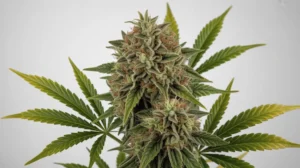
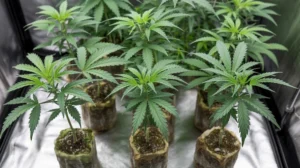
 August 21, 2023
August 21, 2023 


RESPONSES (0)
No responses yet. Be the first to respond!